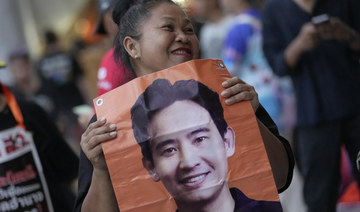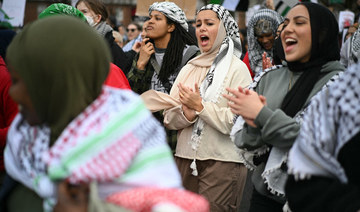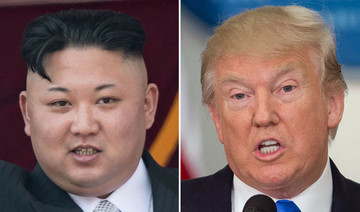BAGHDAD: Security forces used live fire and tear gas to disperse demonstrators in renewed protests in Baghdad on Wednesday, a day after at least two Iraqis were killed and 200 wounded in clashes over unemployment, corruption and poor public services.
At least eight protesters were wounded in the Zafaraniya district of southeast Baghdad when police and the army opened fire and launched tear gas canisters to disperse dozens of protesters, police sources said.
Iraqi President Barham Salih said peaceful protesting is a constitutional right, Iraqi state news agency reported on Tuesday.
Meanwhile, police should be patient and protect the demonstrators, the Commander of Iraqi Federal Police Lieutenant General Raed Shaker Jawdat said.
In northern Baghdad, about 200 protesters took to the streets of the Shaab district and blocked a key highway linking the capital to the northern cities. Soldiers went into the area to disperse them, police and eyewitnesses said.
The main protest on Tuesday erupted in Baghdad, where one protester was killed, with some demonstrations taking place in other areas, including in the southern city of Nassiriya where a protester was also shot dead, according to police.
A government statement on Tuesday said 40 members of the security forces were among those injured and blamed “groups of inciting riots” for the violence.
The United Nations on Wednesday expressed concern over the violence and urged calm, with the Special Representative of the United Nations Secretary-General for Iraq, Jeanine Hennis-Plasschaert reaffirming in a statement the right to protest.
“Hennis-Plasschaert urges the authorities to exercise restraint in their handling of the protests to ensure the safety of peaceful protesters while upholding law and order and protecting the people, public and private property,” it said.
On Wednesday, security forces blocked several roads in Baghdad, including a bridge that leads to the fortified Green Zone, which houses government buildings and foreign embassies, as part of tightened security measures, a security source said.
“Orders from our commanders are clear and definitive; no protesters are to approach the Green Zone,” said one security official.
In a bid to temper angry protests, Prime Minister Adel Abdul Mahdi on Tuesday issued a statement promising jobs for graduates. He instructed the oil ministry and other government bodies to start including a 50% quota for local workers in subsequent contracts with foreign companies.
Oil-rich Iraq has suffered for decades, from rule by Saddam Hussein including years subject to UN sanctions, to the 2003 US invasion and civil war it unleashed, and then the battle against Islamic State, which was declared won in 2017. Graft is widespread and basic services like power and water are lacking.
Eight injured in second day of Baghdad protests
Eight injured in second day of Baghdad protests

- The president said peaceful demonstrations are a constitutional right
- Around 200 demonstrators blocked an important highway in northern Baghdad
Thai minister quits over legal complaint seeking PM’s dismissal

- Pichit Chuenban says his resignation would allow the country ‘to move ahead and not impact the administrative work of the prime minister that needs continuity’
BANGKOK: A Thai minister at the center of a pending legal complaint seeking the dismissal of Prime Minister Srettha Thavisin resigned on Tuesday, in an effort to insulate the premier from possible repercussions.
A group of 40 senators lodged a complaint to the Constitutional Court last week against Pichit Chuenban, 65, saying his appointment last month as minister to the prime minister’s office breached the constitution, as he has a criminal record.
The court was due on Thursday to decide whether or not to accept the case, which could lead to Srettha’s suspension.
“Even though I have been vetted and honestly believe that I am qualified by law, this matter is linked to the prime minister,” Pichit said in his resignation letter, shared with media by Srettha’s office.
He said his resignation would allow the country “to move ahead and not impact the administrative work of the prime minister that needs continuity.”
It was not immediately clear whether the resignation would have any impact on the complaint submitted to the court.
Pichit was jailed for six months in 2008 for contempt of court after an alleged attempt to bribe court officials with 2 million baht ($55,000) hidden in a paper grocery bag.
His law license was suspended for five years by the Lawyers Council of Thailand after the incident. The government has said it carefully vetted Pichit’s qualifications and was confident it could defend his appointment before the court.
Pichit becomes the third minister to quit Srettha’s cabinet, after his foreign minister and deputy finance minister resigned following a cabinet reshuffle last month.
The senators, whose term has ended, are currently lawmakers in a caretaker capacity pending the selection of a new chamber. They have accused Pichit of lacking integrity and ethical standards to hold a ministerial post.
Government critics say Pichit was appointed due to his close relationship with a client, ex-premier Thaksin Shinawatra, who returned to Thailand last year after 15 years in exile. Thaksin, an ally of Srettha, still wields considerable political influence, despite officially being retired.
The government has insisted Pichit was appointed due to his capabilities.
Arab Americans reject Biden, Trump reelection: Survey

- President gets 7%, predecessor 2% support because of Gaza ‘genocide’
- Much higher backing for third-party candidates Jill Stein, Cornell West
CHICAGO: A national survey of Arab Americans released on Monday shows that most respondents overwhelmingly reject the reelection of both President Joe Biden and his predecessor Donald Trump.
Conducted by the Arab American Anti-Discrimination Committee and the Truth Project on May 17 and 18, the survey shows support for Biden at 7 percent and Trump at 2 percent.
Arab and Muslim voters played a significant role in helping Biden defeat Trump in several key swing states in the November 2020 presidential election.
After taking office in January 2021, Biden responded by unveiling “A Plan for Partnership” with the Arab-American community that was to help strengthen ties with his administration.
But Biden’s unequivocal backing of Israel, including helping to approve more than $40 billion in military aid for the country’s alleged genocide in Gaza — which has taken more than 35,000 Palestinian lives — has all but erased that support and his edge over Trump in key swing states, according to the survey organizers.
“Since the start of the genocide many have speculated about who Arab Americans would vote for — Biden or Trump. The answer is neither, with third-party candidates getting substantial support,” ADC National Executive Director Abed Ayoub said in a statement to Arab News.
Third-party candidates Dr. Jill Stein and Dr. Cornell West received much higher support among Arab Americans.
Stein, who is Jewish and with the Green Party, received 25 percent support while West, who is African American, received 20 percent.
Not mentioned in the survey was leading third-party candidate Robert F. Kennedy Jr. His views have varied from calling for peace and recognition of Palestine to rejecting accusations that Israel’s actions in Gaza constitute genocide. Kennedy has declined repeated requests from Arab News for interviews.
Five national polls released in March and April from Quinnipiac University, Fox News, Marquette Law School, NBC News and Marist College showed Kennedy with 13 percent support for his independent presidential bid. Stein and West received only 3 percent each in the national polls.
As the presidential election approaches, “it is evident that Arab-American and allied voters are supporting candidates that are listening to our concerns and demands,” ADC said.
In its survey, 19 percent of Arab Americans said they were “undecided” and 3 percent said they would not vote in November.
ADC said support for Stein and West is based on the two running on an anti-genocide platform.
Stein has been a “strong and vocal supporter of Palestine” throughout her career, ADC noted, adding that West has also adopted this stance.
Arab, Muslim and other voters have shown significant opposition to Biden’s reelection in more than 30 state primaries, including five key swing states where he won by slim margins over Trump.
The primary election campaigns have been led by the #AbandonBiden movement, which told Arab News that it is considering hosting its own “Presidential Convention” in the autumn to galvanize Arab, Muslim and “progressive” voters to consider alternatives to Biden.
The ADC / Truth Project survey is based on outreach to 36,139 Arab Americans and “allied voters” who were asked one question: “Who are you voting for in November?”
Over the two days, 2,196 (6 percent) responded. ADC said this was “a high level of enthusiasm” in the presidential election race.
The Truth Project is a social welfare body committed to uniting a diverse coalition of Americans and organizations who support justice and equality in Palestine.
ADC has a large national grassroots membership base, and was founded in the 1980s to fight for civil and Arab-American rights.
North Korea’s Kim was ‘sincere’ in Trump talks: Seoul’s former president Moon

- Former South Korean president Moon Jae-in was instrumental in brokering two high-profile summit meetings between Kim Jong Un and then-US president Donald Trump
Moon, who led South Korea for five years from 2017, was instrumental in brokering two high-profile summit meetings between Kim and then-United States president Donald Trump, aimed at securing Pyongyang’s denuclearization in return for sanctions relief.
But after the second summit collapsed in 2019, diplomatic outreach was abandoned, with relations between the two Koreas now at one of their worst points in years, as Kim doubles down on weapons production and draws closer to ally Moscow.
In the memoir released Friday, titled “From the Periphery to the Center,” former president Moon outlined in great detail his interactions with the North Korean leader.
“Kim said he would forsake nuclear weapons if there was a guarantee of regime survival,” Moon said in the book, adding that he felt the young North Korean leader was “very honest.”
According to Moon, Kim’s reasoning was: “I have a daughter and I do not wish her generation to live with nuclear weapons... Why would we continue to live in difficulty, under sanctions, with nuclear weapons if our security can be guaranteed?“
But the North Korean leader was “well aware of mistrust from the international community and the (belief from the) US that the North had been lying” about its commitments to denuclearization, Moon said.
Kim specifically asked him how the North could manage to “make Washington believe in our sincerity” to disarm.
In five years since the Hanoi summit, Pyongyang has declared itself an “irreversible” nuclear weapons power, accelerated weapons development, branded Seoul its “principal enemy” and threatened war over “even 0.001 mm” of territorial infringement.
It has also moved closer to Moscow, purportedly supplying it with arms in exchange for space technologies, something which would violate rafts of United Nations sanctions on both countries.
Despite how things have played out, Moon said in his memoir that he still believed Kim was sincere in his plans to denuclearize, but that it was strongly contingent on “corresponding measures” from the US.
Kim and Trump failed to strike a deal because Washington demanded complete denuclearization before it would consider providing sanctions relief, Moon wrote.
“In retrospect, I regret that (South Korea) did not mediate more effectively by listening to the North’s demands and relaying them to Washington if deemed reasonable,” he said.
“Though there are negative views about Trump, he was a very good fit for me as a counterpart in alliance diplomacy,” he said.
“While there are assessments that he is rude and harsh, I liked him for his honesty. A person who has a smiling face but acts differently and thus can’t be read is more difficult to deal with,” he added.
Trump was both apologetic and regretful that the Hanoi summit ended without a deal, Moon wrote.
Trump was “willing to accept (the North Koreans’ terms) but then-Security Adviser John Bolton fervently opposed it,” Moon wrote.
When Trump asked then-Secretary of State Mike Pompeo for a second opinion, he agreed with Bolton, leaving Trump no option but to walk away, Moon wrote.
It is impossible to take Kim’s words at face value now, Hong Min a senior analyst at the Korea Institute for National Unification in Seoul, said.
What was clear “is that Kim tried to change the status quo by expressing his intention to denuclearize,” he said.
The only way to know if Kim was serious, would have been to strike a deal in Hanoi and “gauge how far the North would go toward denuclearization,” he added.
Moon was succeeded by conservative Yoon Suk Yeol, who has taken a significantly more hawkish stance on North Korea.
Yoon has not commented on the memoir but his minister for unification Kim Yung-ho said on Monday that taking Kim’s words at face value could have lead to a security-related “miscalculation.”
“While ignoring North Korea’s (nuclear) capability, if we only focus on the North’s intentions, this could result in a miscalculation of the security situation,” he said, according to the Yonhap news agency.
Military courts no novelty in Pakistan but returning ‘with force’ — Amnesty International

- At least 103 people linked to May 9 riots currently being tried by army courts
- Military courts operate under separate system from the civilian legal system
ISLAMABAD: Civilians should not be tried by military courts, Amnesty International Secretary-General Dr. Agnès Callamard said in an interview published on Tuesday, lamenting that the practice had been widely used in Pakistan’s history and was now returning “with force.”
Military courts have been in the spotlight since last year when hundreds of alleged supporters of former prime minister Imran Khan’s Pakistan Tehreek-e-Insaf (PTI) party were arrested following riots on May 9 in which military and government installations were damaged.
The government at the time as well as the army said those found to be behind attacks on military properties would be tried in army courts. At least 103 people linked to the May 9 riots are currently being tried in army courts, unleashing widespread criticism from within Pakistan and rights organizations globally over the courts’ secretive nature and existence alongside a functioning civilian legal system.
Last month, Pakistan freed at least 20 people previously detained by the military in connection with the May 9 riots.
“Civilians should not be tried by military courts,” Dr. Callamard said in an interview to Pakistan’s Dawn published on Tuesday, when asked about the military trial of civilians in Pakistan. “Sadly, it has happened throughout Pakistan’s history. Even though it is now coming back with force, it is not a novelty in Pakistan’s history.
“Pakistan is the only country in South Asia in recent history to allow military courts to play such a role vis à vis civilians,” she said, adding that historically military trials in Pakistan were held secretly and without transparency.
The Supreme Court last October declared null and void the trial of civilians by military courts arrested in the wake of the May 9 protests, but overturned its own verdict in December and allowed the army to resume hearing the cases of 103 civilians.
Pakistan’s Army Act of 1952 established military courts primarily to try members of the military or enemies of the state. Civilians can only be tried under a federal government order.
Civilians accused of offenses such as waging war against the armed forces or law enforcement agencies, or attacking military installations or inciting mutiny, can be tried at military courts.
Military courts operate under a separate system from the civilian legal system and are run by military officers. The judges are also military personnel and cases are tried at military installations.
Trials are closed to outsiders, and no media presence is allowed.
Anyone tried under the Army Act has the right to defend themselves and a counsel of their choice. There is no right to appeal but individuals can challenge the question of jurisdiction in high courts and the Supreme Court.
Riyadh Air and Saudia agree new joint training programs

RIYADH: Saudi Arabia’s two national airlines will work together to train pilots, aircraft crews and other aviation employees thanks to a new deal.
Riyadh Air, the airline announced by Crown Prince Mohammed bin Salman in March 2023, has reached an agreement with the Saudi Academy – affiliated with the Saudia group, the national carrier of the Kingdom.
The memorandum of cooperation, signed at the Future Aviation Forum in Riyadh, represents a turning point in specialized education in the field of aviation for Saudi Arabia’s national carriers, paving the way towards improving the training standards of pilots, aircraft crews and air operations, according to the Saudi Press Agency.
The agreement will enable the two national carriers to integrate their expertise and resources to provide training programs covering a wide range of specializations, SPA’s report added.
These programs will include technical training, aviation basics, and ground operations, as well as management principles, linguistic proficiency, and compliance with regulatory provisions and standards.

















